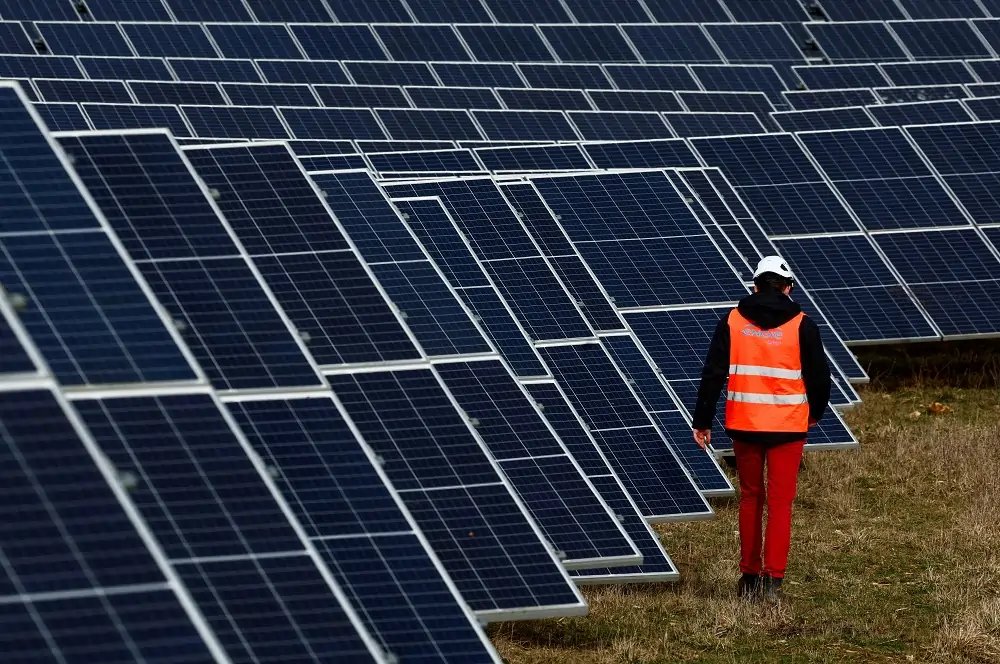French renewable energy sector says far-right victory risks trouble for industry


By Forrest Crellin and Benjamin Mallet
PARIS (Reuters) – The French renewable energy sector is bracing for a sharp slowdown in wind and solar projects if the far-right wins a majority in upcoming elections, just as new legislation was expected to boost the industry in nuclear-dominant France.
President Emmanuel Macron’s shock decision on Sunday to call a snap election could hand political power to Marine Le Pen’s far-right National Rally (RN) party, leaving it in charge of domestic policies including energy.
The RN has pledged to end subsidies for renewables and wants to halt expansion of wind power, including pulling down already installed turbines. The party would instead invest in nuclear, hydropower and hydrogen, according to its website.
“It is clear that an RN-dominant parliament would facilitate the implementation of legislation that would at least slow down the development of renewable energy projects,” said a spokesperson at Velocita Energies, a unit of China’s Envision Energy, which operates wind farms in France.
Shares in Engie, France’s largest wind farm operator, have dropped 6.1% since Monday, wiping 2.1 billion off its market value.
France lags its neighbours on renewable energy with about 45 gigawatts (GW) of installed wind and solar power capacity, and has fallen behind targets set by the European Commission. Around 65% of its power supplies came from nuclear in 2023.
But the government was due to introduce legislation on Thursday outlining plans for a rapid expansion of solar and wind farms, with a formal consultation expected to start on June 27.
The plans included targets to double the annual pace of solar installations to reach 75-100 GW in 2035, with 40-45 GW of onshore wind installations and 18 GW of offshore wind capacity planned over the same period.
The legislation, already delayed for almost a year, will now be shelved ahead of elections to kick off on June 30.
The RN would likely not dismantle existing wind turbines due to the threat of legal action, but new permitting could stop if the RN holds power, said a manager at a European utility with wind farms in the country, who declined to be named.
Government support for solar panels was expected to cost around 590 million euros in 2024. Onshore wind power however would generate nearly 3 billion euros for the state, according to an assessment by the French Energy Regulatory Commission.
A slower renewables rollout could also impact France’s ability to cover its energy demand over the next 15 years before it builds new nuclear reactors, added Rana Adib, executive director at renewable energy lobby group REN21.
“France must contribute to the European energy system by developing, alongside nuclear power, renewable energy sources which have demonstrated their strengths and competitiveness and will be essential, taking into account the cost and timetable for deploying new nuclear power,” Engie said in a statement.
(Reporting by Forrest Crellin and Benjamin Mallet in Paris; Editing by Jan Harvey)
Renewable energy is energy derived from natural sources that are replenished at a faster rate than they are consumed, such as solar, wind, and hydropower.
Wind power is the process of converting wind energy into electricity using wind turbines, which harness the kinetic energy of moving air.
Nuclear energy is the energy released during nuclear fission or fusion, which can be harnessed to generate electricity.
Hydropower is a form of renewable energy that generates electricity by using the energy of flowing or falling water.
Explore more articles in the Top Stories category











